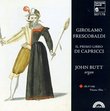| All Artists: George Frideric Handel, Robert King, Yvonne Kenny, Susan Gritton, The King's Consort, Oxford Choir of New College, Choiristers of Salisbury Cathedral, Catherine Denley, James Bowman, Michael George, Colin Campbell, Adrian Peacock Mark Milhofer Title: Handel - Deborah / Y. Kenny · Gritton · Denley · Bowman · M. George · The King's Consort · King Members Wishing: 0 Total Copies: 0 Label: Hyperion UK Original Release Date: 1/1/1993 Re-Release Date: 2/23/1994 Album Type: Import Genre: Classical Styles: Opera & Classical Vocal, Historical Periods, Baroque (c.1600-1750) Number of Discs: 2 SwapaCD Credits: 2 UPC: 034571168418 |
Search - George Frideric Handel, Robert King, Yvonne Kenny :: Handel - Deborah / Y. Kenny · Gritton · Denley · Bowman · M. George · The King's Consort · King
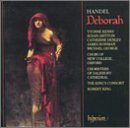 | George Frideric Handel, Robert King, Yvonne Kenny Handel - Deborah / Y. Kenny · Gritton · Denley · Bowman · M. George · The King's Consort · King Genre: Classical
Deborah is one of Handel's earliest oratorios, and it contains a lot of music recycled from other pieces--not that it really matters with Handel, who recycled whole works by other composers into some of his other oratorios... more » |
Larger Image |
CD DetailsSynopsis
Amazon.com Deborah is one of Handel's earliest oratorios, and it contains a lot of music recycled from other pieces--not that it really matters with Handel, who recycled whole works by other composers into some of his other oratorios. The real reason the piece has never caught on is the plot, in which the heroine lures her enemy into her tent, seduces him (we presume), then nails him to the floor with a tent peg through the brain. OK, so it isn't The Omen, but it's as close as Handel ever got. Fine performance, fun music, disgusting story. That's life. --David Hurwitz Similar CDs
|
CD ReviewsHandel goes Tarentino and it is good Mike Birman | Brooklyn, New York USA | 07/22/2004 (5 out of 5 stars) "The year 1732 had ended dismally for Handel. Once the toast of London, master of Italian Opera and in snug with the Crown and the rest of London's music besotted Royalty (cognoscenti and dilettantes both), a reaction against Italian Opera had assumed fever pitch with the production of John Gay's Beggar's Opera and the newly formed "Opera of the Nobility". Handel's well-heeled friends were deserting him and his purse was thin. In desperation, on May 2 of that year, a reworked version of a 1718 Masque entitled Esther was presented without dramatic staging. It was modestly successful, enjoying 6 performances. It enabled Handel to pocket 700 Pounds which he promptly invested in a South Seas venture. Thus was Handellian Oratorio born. So in 1733, realizing that Italian Opera was probably dead for now yet unwilling to take the hint that Opera in England should be written IN English, Handel took advantage of his small success with Esther and hurriedly composed (assembled is perhaps more accurate) a second Oratorio to a libretto by Samuel Humphreys based on the Book of Judges, chapter 4. The chosen story is gruesome, perhaps reflecting Handel's mood and desire for revenge, if only artistic. The Israelites, 20 years captive, are told by the prophetess Deborah that Sisera, the Canaanite commander, will be killed by a woman. After they go to war, Sisera dutifully flees the battlefield seeking sanctuary in the tent of the beautiful young Jael, wife of Heber the Kenite. She protects him, gives him a bowl of milk, then seduces him. Obviously weary (and full of milk), Sisera falls asleep in her arms. While he sleeps soundly, Jael rises stealthily and nails his head to the ground with a tent peg. General rejoicing and alarums follow with Jael praised by one-and-all for her nobility and wicked mallet hand. That is one zany plot for an Oratorio. The libretto itself is somewhat sketchy, indicating the haste with which it was written. Handel's music is assembled from several sources, including the Coronation Anthems, the Chandos Anthems, the Birthday Ode for Queen Anne and Dixit Dominus. The scoring of Deborah is expansive. Handel utilizes an eight-part choir and a large orchestra containing strings, oboes, bassoons, flutes, three horns, three trumpets, timpani, harpsichord and two organs. There are also ripieno lines for cellos and bassoons and detailed instructions for the disposition of the keyboard instruments. This recording, another in Robert King's superlative series of Handel's lesser known Operas and Oratorios, features the same high level of performance. The King's Consort plays beautifully. They are a band with exquisite finesse, easily my favorite Baroque orchestra. The Choir of New College, Oxford and the Choristers of Salisbury Cathedral are perfection. This music is in their bones. The assembled cast, one often associated with Mr. King, make the most of what is a rather thin libretto. Soprano Yvonne Kenny is fine as Deborah. Soprano Susan Gritton is a winning and seductive manslaughter-minded Jael. Catherine Denley, mezzo-soprano, is the lactose intolerant Sisera. Countertenor James Bowman, an old hand to this repetoire, is Barak. He is in particularly fine voice here. The recording itself is bright, warm and clear. Sonics are broad and deep, with a nice illusion of space. This is a great performance of an historically important work by Handel. If you like your Handel seasoned with finesse and taste, you will enjoy this recording. Strong recommendation and 5 stars for another significant release by Hyperion. " THE OTHER BIBLE DAVID BRYSON | Glossop Derbyshire England | 03/07/2007 (5 out of 5 stars) "Judges 4 is not a chapter of holy scripture that is often selected as a sermon-text. The incident in which Jael, wife of Heber the Kenite, invites the vanquished Canaanite general Sisera into her tent and skewers his head to the floor with a tent-peg while he sleeps is not actually a more gory episode than many in the Old Testament: what really keeps the passage off-limits is the suspicion that she may have seduced him. Myself, I am not at all convinced of this. Sisera was no doubt exhausted, and quite likely not in the mood for anything more passionate than the bowl of milk that Jael had provided and owns up to. One way or the other, the tent-peg assassination dominates the comment I have been reading about the libretto of Deborah, but it would be a complete mistake to think that it dominates the libretto itself, still less the music. It is passed over summarily in a single recitative near the end of an oratorio that is about other issues entirely.
The entire process of the composition of Deborah took place in conditions of frantic haste. This was the case not only with Handel but also with his librettist Samuel Humphreys. Robert King, in his typically fine liner-note, finds that the time-pressure shows in the libretto which seems to him a succession of tableaux, but I have a better opinion of it. The libretto of Solomon is my own idea of a series of tableaux and disconnected episodes, whereas that of Deborah by accident or design contrives to form a very coherent framework for an oratorio. The buildup of tension between the enslaved Israelites and their Canaanite masters, the dramatic reflections and proclamations of the main participants, and the choral episodes alternately extolling the respective deities and commenting on the situation as it develops - all this makes fine oratorio material, and it is all better without battles and whatnot in my own opinion. As for the tale of the tent-peg, with its foreshadowing of Dinsdale Piranha in the Monty Python sketch, I doubt it would make the slightest difference if the recitative in which it gets its solitary mention were simply left out. In fact Handel's Deborah seems to me a highly successful effort, for all the difficult circumstances of its composition. How much of the music was freshly composed for it I can't tell from King's commentary. Clearly, a great deal was recycled, but it would be another mistake to think that this was some mechanical or automatic process. Some numbers are indeed lifted note-for-note from elsewhere, but in others there has been substantial recomposition. King is fascinating on this topic if less clear than he might have been, but my own feeling is that absolutely nothing has been incorporated in any careless or insensitive way, and indeed I note that King feels that the music to the chorus 'Despair all around them' near the end of Act I is better suited to its new text here than to its source in one of the coronation anthems. The music, wherever it came from in Handel's other oeuvre, is uniformly excellent and sometimes superlative, and perhaps my own prize would go to the awesome chorus Lord of Eternity in Act II. I never find in Handel the contemplative tone that so characterises Bach, but Handel has another approach to the Almighty, and when Handel's chorus sings 'Lord of Eternity', there He is, more surely in front of us than even Michelangelo could depict Him. The choral work is exceptionally important, even for Handel, in this oratorio, and much of it is exceedingly grandiose and big-scale in its scoring. The contributions of the choir of New College and the Salisbury Cathedral choristers are exemplary, but if I have one slight disappointment with this set it is that the recording is less vivid and immediate than I have got used to from other productions in King's great Handel series. There is nothing really 'wrong' with the sound, and I'm finding that a high volume-setting helps, but I still can't help thinking it a slight pity that the engineers have chosen to be a little demure in Deborah of all the oratorios. As for the soloists, I have not a word of criticism to offer. They are all in fine voice, and they all have fine voices to be in. In particular the two sopranos offset each other superbly, but if I were to award another of my individual prizes I think it might go to the gorgeous velvet tones of Michael George in his aria 'Tears' in the final act. The instrumental playing is excellent without exception, but when all is said and done my Man of the Match has to be Robert King himself. He has edited the score for performance, he directs with sympathy and expertise, and he gives us another of his fine and endearingly enthusiastic essays for our guidance. We need to forget the tent-pegs and seductions and take this issue as seriously as it deserves and demands to be taken." |

 Track Listings (32) - Disc #1
Track Listings (32) - Disc #1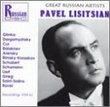

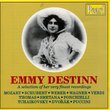


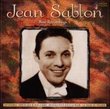
![The Barber of Seville / B. Ford, D. Jones, A. Opie, A. Shore, P. Rose; G. Bellini [in English]](https://nationalbookswap.com/cd//m/04/4004/6004004.jpg)
